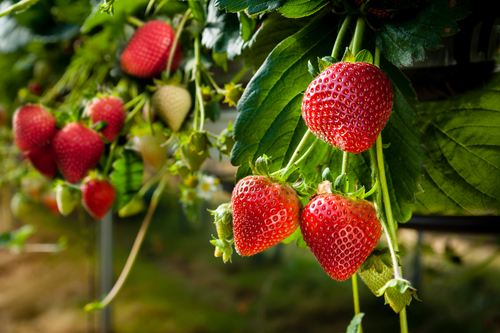
By Ashley Robinson
Although a winter crop, strawberry production in Florida still falls victim to heat stress. With extreme heat during establishment, cool temperatures during the early and mid-harvests, and high temperatures during the late harvest, the crop is subject to dramatic seasonal temperature variations.
Traditionally, the state’s strawberry growers have used black plastic mulch to achieve adequate wintertime soil warming and optimal fruit production. However, black mulch can intensify the negative impacts of high temperatures, leading to greater heat stress, especially when growers advance planting dates (e.g., late September) to improve earliness. Some of the negative effects of heat stress on the plant include greater susceptibility to pests and diseases, nonuniform growth and soft fruit.
On the other hand, reflective mulch films don’t provide enough soil warming during the winter for the plant, so researchers have had to look for a happy medium.
To resolve this issue, researchers at the University of Florida Institute of Food and Agricultural Sciences (UF/IFAS) are looking at the effects of using reflective mulch films; essentially, adding a black center stripe to reflective silver mulch.
Shinsuke Agehara, assistant professor of horticulture at the UF/IFAS Gulf Coast Research and Education Center (GCREC), gave an overview of his research on reflective mulch for strawberry production at the recent Vegetable & Specialty Crop (VSC) Expo.
“The idea is to have the dual benefits of black mulch and reflective mulch,” Agehara says.
According to Agehara, metalized mulch films have the potential to improve early-season fruit development by alleviating heat stress conditions during the establishment period.
Field trials at the UF/IFAS GCREC showed significant early-season yield increases of up to 59% and total season yield increases by up to 30% with reflective mulch films. Other beneficial effects of reflective mulch films include reduced damage from rot, total season yield increases and fruit size increases.
Although there are many benefits to the reflective film, one drawback that Agehara warns growers about is what can happen if your water from your sprinkler irrigation has a high pH.
“Sprinkler irrigation with high pH water, when the pH is greater than 7.5, it can fade aluminum coatings on metalized films,” he says.
If fading of aluminum coatings are an issue, Agehara recommends trying white-on-black mulch, which should perform better than black mulch and nearly as well as metalized mulch.
To view Agehara’s full presentation from VSC Expo, click here.









